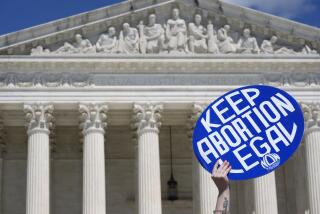Teen Mothers and the Risk of Infanticide
- Share via
Giving birth can exert tremendous pressure on teenage girls who are unprepared for life, much less motherhood. Some respond by leaving the babies with their own mothers or dropping out of school and going on welfare.
In a growing number of cases, however, the outcome of teenage motherhood is the death of the child at the hands of the mother or her boyfriend. Being born to young, poorly educated, unmarried girls, it turns out, gives babies the highest risk of being murdered in their first year of life.
About nine of every 100,000 infants are killed before age 1. Several earlier studies have shown that the risk of infanticide is elevated when the mother is a teenager. In the newest study, researchers from the National Institute of Child Health and Human Development reviewed all infant homicides in the U.S. from 1983 to 1991. They found that 2,776 of the nation’s 34.9 million babies were homicide victims.
Among the findings reported in Thursday’s New England Journal of Medicine:
* Girls under age 17 have 2% of all births, yet their babies account for 7% of all infant homicide victims.
* A baby born to a teenage mother who already has at least one child has nine times the risk of being killed as an infant born to a mother older than 25.
* The babies of women who have not finished high school have an eight-times-higher risk of being killed than those of college graduates.
The study, based on a review of medical records, did not look at who actually killed the children. In general, however, victims of infanticide are almost always killed by a parent.
Anti-Anxiety Drugs Can Raise Car Accident Risk
People who use some of the most commonly prescribed anti-anxiety drugs have a higher risk of traffic accidents and should be advised not to drive, British physicians reported Saturday in the Lancet. The drugs linked to higher risk included benzodiazepines such as diazepam (Valium), alprazolam (Xanax) and lorazepam (Ativan).
Dr. Tom MacDonald and his colleagues from the University of Dundee compared records of all prescriptions dispensed in Tayside, the area around Dundee, to the records of all automobile accidents in the region from April 1992 to June 1995. They found that, overall, the risk of accident was about 60% higher for patients taking benzodiazepines, but three-fold higher if those patients were under the age of 45.
FDA Recommending More Uses for Aspirin
The U.S. Food and Drug Administration said it will let drug-makers tell doctors that aspirin can help a wider range of heart and stroke patients. The new rule expands the recommended uses of aspirin to include both men and women who have had heart attacks, as well as stroke patients and patients with other serious heart disease.
Although aspirin has been proven to reduce the risk of heart attack and stroke by 25%, it has been under-prescribed by doctors. Only 50% of heart attack victims will receive the drug, experts told the FDA advisory panel last year. At that time, researchers from Oxford University in England estimated that 10,000 Americans a year die of heart attacks or strokes because they don’t take aspirin.
Alcohol Warning to Be Required on Painkillers
In a related action, the FDA said it will require makers of all over-the-counter painkillers and fever-reducers to add specific alcohol warnings to their labels. “Consumers need to know that chronic use of alcohol while taking pain relievers or fever reducers can be hazardous to their health,” said Michael Friedman, lead deputy commissioner for the FDA.
In essence, the warnings say that all people who consume more than three alcoholic beverages per day should consult their physicians before taking the painkillers, including such products as aspirin, ibuprofen, acetaminophen and naproxen sodium.
Nutrients May Aid Heart as Much as Wine Does
New research suggests that swallowing a supplement packed with artery-protecting nutrients may be just as effective in preventing heart disease as sipping a good Cabernet. The nutrients are flavonoids, vitamin-like compounds that naturally occur in tea, fruits and vegetables. They make blood cells called platelets less prone to clotting and act as antioxidants, countering the artery-damaging potential of highly reactive free radical chemicals.
The study, funded by supplement manufacturer Melaleuca Inc. of Idaho Falls, Idaho, tested 14 people who took the supplement ProVex CV over seven days. Larger studies are being planned. The findings, presented Tuesday at the annual meeting of the American Dietetic Assn. by researchers from the University of Wisconsin, indicate that pregnant women and others who should avoid alcohol can reap the benefits of red wine without drinking it.
ProVex CV was one of four flavonoid supplements examined by researchers, but was the only one that showed significant benefits. It contains extracts of grape seeds, grape skins, Ginkgo biloba, bilberries and a specific flavonoid called quercetin.
--Compiled by THOMAS MAUGH II






